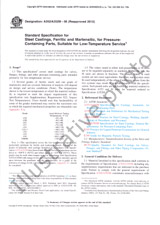We need your consent to use the individual data so that you can see information about your interests, among other things. Click "OK" to give your consent.
ASTM D7552-22
Standard Test Method for Determining the Complex Shear Modulus (G*) of Asphalt Mixtures Using Dynamic Shear Rheometer
Translate name
STANDARD published on 15.12.2022
The information about the standard:
Designation standards: ASTM D7552-22
Publication date standards: 15.12.2022
SKU: NS-1099426
The number of pages: 9
Approximate weight : 27 g (0.06 lbs)
Country: American technical standard
Category: Technical standards ASTM
The category - similar standards:
Waxes, bituminous materials and other petroleum productsBinders. Sealing materials
Annotation of standard text ASTM D7552-22 :
Keywords:
asphalt mixture, complex shear modulus, DSR, dynamic shear rheometer, torsion rectangular specimen,, ICS Number Code 75.140 (Waxes, bituminous materials and other petroleum products),91.100.50 (Binders. Sealing materials)
Additional information
| Significance and Use | ||||||||||||||||||||||||||||||||
|
5.1?The complex shear modulus of asphalt mixtures is a fundamental property of the material. Test results at critical temperatures (TNote 2:?The quality of the results produced by this standard are dependent on the competence of the personnel performing the procedure and the capability, calibration, and maintenance of the equipment used. Agencies that meet the criteria of Specification D3666 are generally considered capable of competent and objective testing, sampling, inspection, etc. Users of this standard are cautioned that compliance with Specification D3666 alone does not completely ensure reliable results. Reliable results depend on many factors; following the suggestions of Specification D3666 or some similar acceptable guideline provides a means of evaluating and controlling some of those factors. |
||||||||||||||||||||||||||||||||
| 1. Scope | ||||||||||||||||||||||||||||||||
|
1.1?This test method covers the determination of the complex shear modulus of asphalt mixtures using torsion rectangular geometry on a dynamic shear rheometer (DSR). It is applicable to asphalt mixtures having complex shear modulus values greater than 1 ? 104 Pa when tested over a range of temperatures from 40 ?C to 76 ?C at frequencies of 0.01 to 25 Hz and strains of 0.0005 % to 0.1 %. The determination of complex shear modulus is typically determined at 20 ?C to 70 ?C at 0.01 % strain at ten discrete frequency values covering 0.01 to 10 Hz. From these data, temperature or frequency master curves can be generated as required. This test method is intended for determining the complex shear modulus of asphalt mixtures as required for specification testing or quality control of asphalt mixture production. 1.2?This test method is appropriate for laboratory-prepared and compacted mixtures, field-produced and laboratory-compacted mixtures or field cores, regardless of binder type or grade and regardless of whether RAP is used in the mixture. Due to the geometry of the specimens being tested this test method is not applicable to open-graded or SMA mixtures. It has been found to be appropriate for dense-graded mixtures, whether coarse- or fine-graded, with 19 mm or smaller nominal maximum aggregate size. 1.3?Since a precision estimate for this standard has not been developed, the test method is to be used for research and informational purposes only. Therefore, this standard should not be used for acceptance or rejection of a material for purchasing purposes. 1.4?The values stated in SI units are to be regarded as standard. No other units of measurement are included in this standard. 1.5?The text of this standard references notes and footnotes which provide explanatory material. These notes and footnotes (excluding those in tables and figures) shall not be considered as requirements of the standard. 1.6?This standard does not purport to address all of the safety concerns, if any, associated with its use. It is the responsibility of the user of this standard to establish appropriate safety, health, and environmental practices and determine the applicability of regulatory limitations prior to use. 1.7?This international standard was developed in accordance with internationally recognized principles on standardization established in the Decision on Principles for the Development of International Standards, Guides and Recommendations issued by the World Trade Organization Technical Barriers to Trade (TBT) Committee. |
||||||||||||||||||||||||||||||||
| 2. Referenced Documents | ||||||||||||||||||||||||||||||||
|
We recommend:
Technical standards updating
Do you want to make sure you use only the valid technical standards?
We can offer you a solution which will provide you a monthly overview concerning the updating of standards which you use.
Would you like to know more? Look at this page.




 Cookies
Cookies
